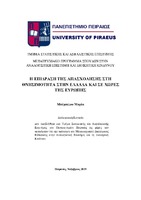Η επίδραση της απασχόλησης στη θνησιμότητα στην Ελλάδα και σε χώρες της Ευρώπης
Effects of occupation on mortality in Greece and other European Countries

Προβολή/
Λέξεις κλειδιά
Απασχόληση ; Θνησιμότητα ; Επίδραση απασχόλησης ; Χώρες ΕυρώπηςΠερίληψη
Η απασχόληση και η ανεργία είναι από τα σημαντικότερα ζητήματα στη ζωή των ανθρώπων τη σημερινή εποχή. Στην παρούσα διπλωματική εργασία θα διερευνηθεί η επίδραση της απασχόλησης στη θνησιμότητα στην Ελλάδα και σε χώρες της Ευρώπης. Για την πραγματοποίηση της μελέτης αυτής θα γίνει χρήση στοιχείων από το δεύτερο κύμα της έρευνας SHARE που πραγματοποιήθηκε το 2007, ενώ θα ληφθούν υπ’ όψιν οι θάνατοι που συνέβησαν μέσα στα επόμενα 8 έτη(μέχρι το 6ο κύμα, 2015).
Στο πρώτο κεφάλαιο αναλύονται οι έννοιες της απασχόλησης/ ανεργίας και της θνησιμότητας/ νοσηρότητας και παρουσιάζονται τα επίπεδα και οι τάσεις τους κατά φύλο και ηλικιακή ομάδα στις χώρες της Ευρώπης. Το δεύτερο κεφάλαιο περιλαμβάνει την παρουσίαση των μεταβλητών από την έρευνα SHARE, καθώς και την περιγραφική τους ανάλυση. Γίνεται μια πρώτη διερεύνηση των διαφοροποιήσεων της θνησιμότητας σε σχέση με δημογραφικά και κοινωνικοοικονομικά χαρακτηριστικά, μεταβλητές σωματικής και ψυχικής υγείας και μεταβλητές απασχόλησης. Στο τρίτο κεφάλαιο παρουσιάζεται η μέθοδος λογιστικής παλινδρόμησης και οι μέθοδοι επάρκειας ενός λογιστικού μοντέλου. Επιπλέον, αναπτύσσονται μοντέλα λογιστικής παλινδρόμησης για την μελέτη της επίδρασης της απασχόλησης και άλλων παραγόντων στη θνησιμότητα.
Τέλος, στο τελευταίο κεφάλαιο παρατίθενται τα κυριότερα συμπεράσματα που προέκυψαν από την ανάλυση των δεδομένων. Συγκεκριμένα, επιβεβαιώθηκε η επίδραση της απασχόλησης στη θνησιμότητα. Όσοι απασχολούνται φαίνεται να έχουν μικρότερη σχετική πιθανότητα θανάτου σε σχέση με όσους δεν εργάζονται (συνταξιούχοι, νοικοκυρές, μόνιμα ασθενείς ή ανάπηροι, άνεργοι). Παράλληλα, ιδιαίτερη σημασία παρουσιάζει και το είδος επαγγέλματος σε σχέση με την θνησιμότητα, καθώς, όσο πιο επικίνδυνο το επάγγελμα (π.χ. ειδικές δυνάμεις), τόσο υψηλότερη είναι η πιθανότητα θανάτου.


